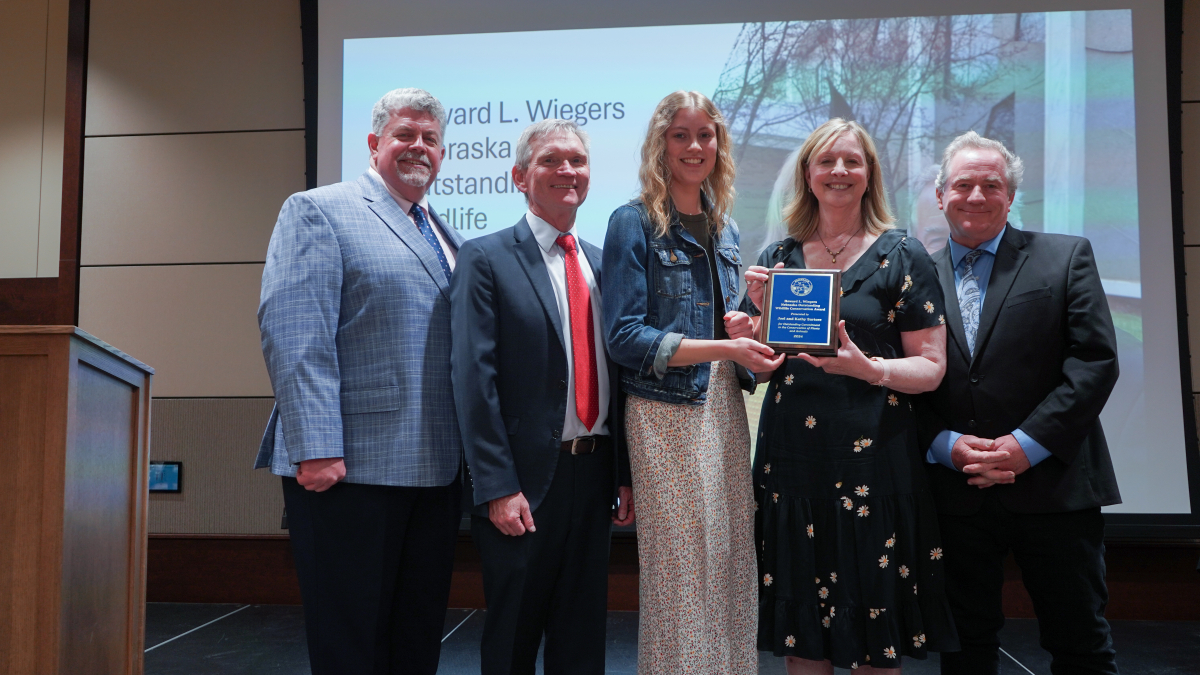
Lincoln, Neb. —The first School of Natural Resources Spring Banquet drew 260 people and many memories to the Nebraska East Union on April 6.
The schoolwide banquet replaced and built upon the Wildlife Club Banquet held since 1960. Although a Wildlife Club committee of students and advisors had planned and organized past banquets, student representatives from five clubs and six staff members planned and organized this year’s banquet.
Caitlin Copenhaver, the student representative of the Wildlife Club, said Wildlife Club members had discussed for years expanding their banquet into a schoolwide one.
“I was so glad we were able to get the ball rolling and do it this year,” she said. “Not only does it help lessen the load on having the Wildlife Club do everything, it also makes it way more inclusive to other clubs and helps with a lot of connections between the department and even other departments, which is super cool.”
Both the Range Management Club and the Soil Judging Team, which helped plan and organize the banquet this year, are clubs shared with the Department of Agronomy and Horticulture. Other clubs new to hosting were the school’s Graduate Student Association and the Herpetology Club. The banquet drew about 100 students, almost double the total attendance of Wildlife Club banquets in the past several years.
“I am sure that the students who planned the first banquet for the Wildlife Club in 1960 would be proud of what our students planned for this year, working with other clubs,” Larkin Powell, director of the School of Natural Resources, said.
The school banquet continued the Wildlife Club’s tradition of holding an awards ceremony. The Wildlife Club gave five awards, including the prestigious Howard L. Wieger’s Nebraska Outstanding Wildlife Conservation Award. That award went to Kathy and Joel Sartore for their work purchasing and conserving Nebraska land for wildlife. The Lincoln residents are conserving land in Sheridan County as habitat for thousands of birds, including long-billed curlews. They have also restored ponds and planted native grasses and wildflowers for pollinators and wildlife on farmland they purchased near Valparaiso.
The School of Natural Resources announced eight awards, and the Range Management Club announced two.
Another tradition the school banquet continued was using ticket sales to raise funds for club activities. Student tickets sold for $5, and all other tickets sold for $30.
Sponsors donated funds, subsidizing student tickets and allowing all ticket sales to go to the clubs. Olsson was the lead sponsor, and the Wildlife Division of Nebraska Game and Parks was a supporting sponsor. Crane Trust, JEO Consulting Group, Robert Kuzelka, The Nature Conservancy of Kansas and Nebraska and the Platte Basin Timelapse sponsored tables.
Powell said all ticket sales went to the five participating clubs. The School of Natural Resources covered the costs of the catered buffet, flowers, printing and signs.
He pointed out that the banquet also benefited students and prospective employers with networking opportunities.
“I am thrilled to have an event that allowed us to invite alumni and friends of the school to join our students, staff and faculty for a time of networking and celebrating our impact,” he said. “Our table sponsors brought employees to network with our students, and that was a really good opportunity for our students.”
Andrew Little, a professor who coadvised the Wildlife Club and the Wildlife Banquet for six years with Elyse Watson, project management specialist, agreed on the importance of including alumni, retired professors and community partners at the banquet.
“One of the main importances is just it's simply a networking opportunity and then also to showcase the great accomplishments that many of us, particularly the students, have been able to accomplish over the past year within the School of Natural Resources,” he said.
Ron Case, an emeritus professor who coadvised the Wildlife Club from 1972–2000, came to this year’s banquet, as he has done since 1973. He said the Lincoln Journal Star and local dignitaries used to have more involvement in the banquet and Governor Ben Nelson even spoke at it for a few minutes in the 1990s.
He remembered coadvising with Howard Wiegers, the poultry professor who started the Wildlife Club and banquet at Nebraska. Wiegers had noted student interest in wildlife and, in 1948, taught the first wildlife course at the university. Later, he started the Wildlife Club for students and, with them, lobbied the administration to institute the fisheries and wildlife program.
The Wildlife Club became a wildlife minor in the 1970s and then became a fisheries and wildlife major. The major led to the Forestry, Fisheries and Wildlife Department, and in 1997, it joined with other groups to form the School of Natural Resources. The school now has 85 faculty members and had 448 students in 2022-2023. It conducts research in 46 countries and has 86 grants, totaling $16.1 million.
Case said he hopes the banquets continue. He encouraged inviting graduates of the program, retired faculty, previous award winners and faculty members from other departments to the banquet.
“These continued contacts help spread goodwill,” he said.
Near the end of the evening, Powell said the School of Natural Resources Spring Banquet had accomplished what the committee and school set out to do.
“What we did here tonight was a success,” he said. “We engaged, we networked, and we celebrated.”
After the banquet ended, Copenhaver, who received student awards from the Wildlife Club and the Range Management Club, remained for a short time to mingle and celebrate the banquet’s success.
“I think everyone's having a really good time, and I’m excited to see where it goes in the future,” she said.
See the full list of award winners here.